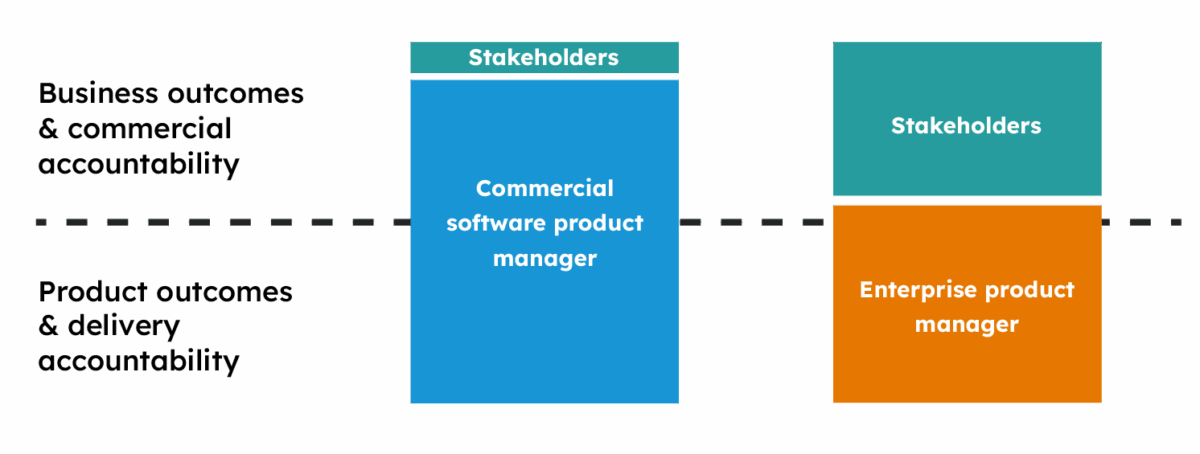Chasing Silicon Valley-levels of influence in an enterprise product management role is a recipe for frustration. As we explored in our earlier blog, “Why Startup and Silicon Valley advice is failing enterprise product managers”, product management in enterprise organisations requires adaptation from the commercial software world. Trying to apply the same approaches and methods can leave product managers feeling disillusioned and stuck.
But there are steps that product managers can take to increase their influence and empowerment, without fighting the realities of working in an enterprise organisation.
Stage one: Let go of unrealistic expectations
The starting point for product managers is to let go of unrealistic comparisons with commercial software companies and Silicon Valley tech companies. In an enterprise world, product managers inevitably cede some accountability to stakeholders, but this is not a reflection of their quality or capabilities.
It’s essential to accept that, in an enterprise organisation, the commercial product management role is effectively split into two: product managers handle software delivery and product performance metrics, while your business stakeholders are accountable for business objectives and outcomes.

Trying to force commercial-style influence on enterprise stakeholders will only trigger resistance from entrenched business models, internal politics and power structures within non-software-first companies. It will create unnecessary friction and ultimately make the product manager’s role harder.
Stage two: Work with the system, not against it
Instead of battling for control that will never be forthcoming, product managers should embrace their reality and focus on influencing business decisions on scope and direction from the inside out.
1. Build commercial credibility by moving beyond the technical details
Commercial software product managers often have an entrepreneurial, finance, or marketing background, but this is not always the case for enterprise product managers. With backgrounds typically in delivery or technical roles, they may lack the commercial foundation required to influence business decisions.
Learning how the business truly operates—how it generates revenue, its overarching strategic goals and who makes the key decisions—is critical. Building this commercial muscle enables stakeholders to understand and see product managers as vital contributors to the success of the business, not just glorified order-takers.
2. Invest in strong stakeholder relationships
Strong relationships are essential to extending influence within enterprise organisations. Product managers who spend dedicated time with finance teams, commercial stakeholders, and other key business leaders gain a deeper understanding of the business and its direction. Decisions that may have seemed irrational or counterintuitive from the outside often make perfect sense when the big picture is understood.
Product managers should also recognise that not everyone shares their own enthusiasm for technology. Stakeholders care about solving business problems and seizing new opportunities, so product managers who speak their language can build deeper, more effective relationships.
3. Build trust through consistent, valuable delivery
No amount of business credibility or strong relationships can compensate for poor performance of software delivery. Consistently shipping valuable, high-quality software is the foundation of influence. A reliable track record creates the trust needed for stakeholders to take product managers’ insights seriously and eventually involve them in strategic discussions.
What does success look like?
By combining business acumen, stakeholder empathy, and a proven track record of delivery, product managers can stop being a conduit for demands and start becoming partners in the process. Empowered with influence, they engage in more informed, impactful conversations with stakeholders by gently challenging assumptions, bringing data and evidence to discussions, and suggesting alternative hypotheses or approaches for consideration.
Instead of trying to seize control of stakeholders’ accountability or dictate commercial strategy, product managers position themselves as someone who stakeholders truly trust for judgment and understanding of user needs and product performance.
Eventually, over time, stakeholders begin to proactively seek out product managers’ advice on strategy and, it is at this point, they know they have become something different. Something new: a trusted advisor.
Start building product influence today
Now that we have covered the high level path to becoming a powerful enterprise product manager, future articles will cover practical examples of tactics and techniques to improve product credibility and influence in the organisation.
Want to accelerate your product team’s influence? At Equal Experts, we help teams shift their product operating models through practical advice, hands-on support, product maturity assessments and more. Contact our team to find out more about our product service.





